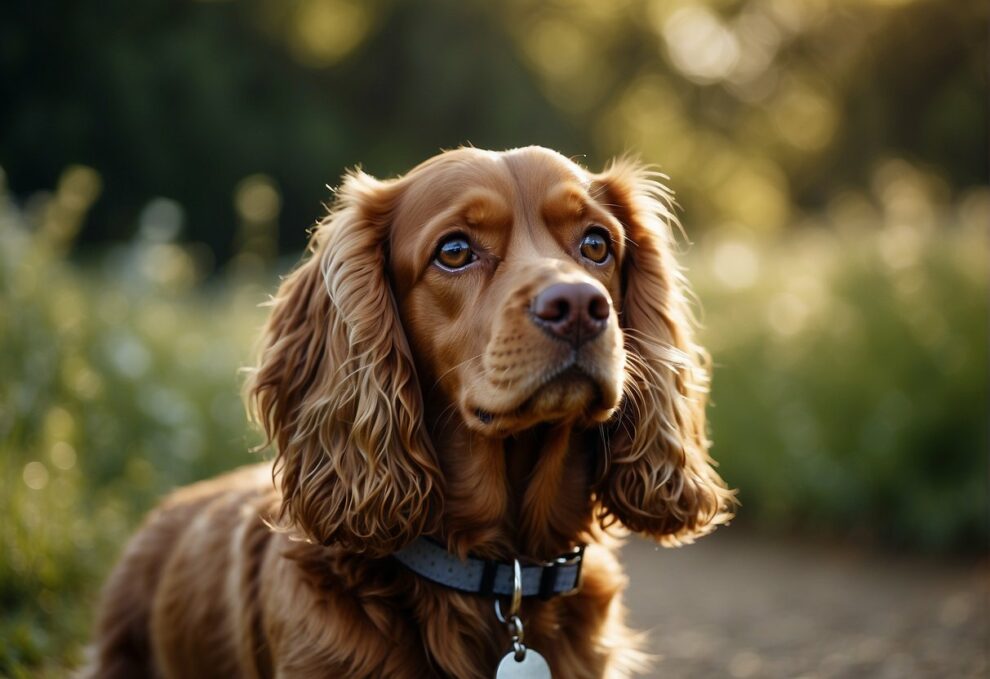Glaucoma in Cocker Spaniels is an eye health issue that affects many dogs within this breed.
Characterized by increased pressure within the eye, glaucoma can lead to discomfort and, if left untreated, could result in blindness.
This condition manifests in two forms: primary glaucoma, which is hereditary and relates to the eye’s inability to properly drain through the natural filtration angles, and secondary glaucoma, which is typically the consequence of another eye condition or injury leading to reduced drainage.
Owners may notice signs such as cloudiness in the eye, redness, or excessive tearing, which could indicate the presence of this ailment.
While conventional treatments primarily include medications and surgery, some pet owners are also interested in exploring natural remedies that can complement traditional care and support their Cocker Spaniel’s eye health.
Understanding Glaucoma in Cocker Spaniels

Types of Glaucoma
Glaucoma in dogs can be divided into two categories: Primary Glaucoma and Secondary Glaucoma.
Primary Glaucoma is an inherited disease often found in Cocker Spaniels, occurring when there’s an issue with the eye’s drainage angle.
On the other hand, Secondary Glaucoma arises as a complication of other eye problems, such as uveitis or cataracts, leading to the obstruction of intraocular fluid drainage.
Common Symptoms and Diagnosis
The symptoms of glaucoma in Cocker Spaniels can range from subtle to intense.
Owners may notice redness of the eye, tearing, a cloudy cornea, or the dog may paw at their eye due to discomfort.
As glaucoma progresses, the eye may appear enlarged, a condition known as buphthalmos.
To properly diagnose this condition, a veterinarian will measure the intraocular pressure using a tonometer and may perform additional tests such as gonioscopy to assess the drainage angle.
Hereditary Aspects and Prevalence
Glaucoma has a known hereditary component, particularly the primary type.
In Cocker Spaniels, this condition is prevalent, underscoring the necessity for breeders to screen their breeding stock.
Regular eye check-ups are recommended for early detection and management, as there are cocker spaniel eye problems that can increase the risk of developing glaucoma.
A history of the condition in a dog’s lineage warrants more vigilant monitoring for symptoms.
Natural Remedies for Eye Health

In caring for Cocker Spaniels with glaucoma, owners often seek natural strategies to complement conventional treatments.
Focusing on eye-specific nutrition and herbal supplementation can be essential elements.
Nutritional Support for Eye Health
A balanced diet rich in antioxidants and specific nutrients can play a crucial role in supporting eye health.
Carrots are well-known for their rich beta-carotene content, which the body converts into vitamin A, crucial for maintaining good vision.
Spinach provides lutein and zeaxanthin, two antioxidants that help protect the eyes by filtering harmful high-energy light waves.
- Carrots: Source of beta-carotene.
- Spinach: Packed with lutein and zeaxanthin.
Ensuring a diet high in Vitamin C from fruits and vegetables can support eye health due to its role in regulating ocular pressure.
Including sources of magnesium, such as leafy greens, nuts, and seeds, may also benefit eye health by improving blood flow to the eyes.
Supplements and Herbs
In addition to a balanced diet, certain supplements and herbs could offer extra support for Cocker Spaniels with glaucoma.
While not a direct treatment, CBD oil has been noted for its anti-inflammatory properties and may help in managing discomfort associated with glaucoma.
- CBD Oil: Known for anti-inflammatory effects.
Furthermore, incorporating herbal remedies such as Ginkgo Biloba and Bilberry can be beneficial due to their antioxidant, anti-inflammatory, and circulation-promoting properties, which have been discussed in relation to natural treatment for glaucoma.
It’s important for owners to consult with a veterinarian before starting any new supplement or herb for proper dosing and to prevent potential interactions with current medications.
Conventional Treatments and Medications

When managing glaucoma in Cocker Spaniels, veterinarians typically prescribe a combination of medications and, in some cases, recommend surgery to either reduce intraocular pressure or address the damage caused by the condition.
1. Eye Drops and Their Role
Eye drops are often the first line of defense in treating glaucoma in Cocker Spaniels.
Latanoprost and timolol are common eye drops that help lower intraocular pressure by increasing fluid outflow from the eye or decreasing fluid production.
Consistent use of these medications can be crucial in preventing further optic nerve damage.
2. Oral Medications
In addition to eye drops, oral medications such as dorzolamide may be prescribed to manage glaucoma.
These systemic medications work to decrease the production of aqueous humor, the fluid inside the eye, thereby reducing intraocular pressure.
Oral medications are typically used when eye drops alone are insufficient in controlling the condition.
3. Understanding Surgical Options
When medications are not enough to control the glaucoma, or if the disease progresses rapidly, surgical options may be considered.
These can range from minimally invasive laser surgery to more extensive procedures like removing the affected eye, known as enucleation.
Surgery is usually seen as a last resort, but it can be a necessary step to alleviate pain or to prevent complete vision loss.
Monitoring and Managing Glaucoma

Cocker Spaniels, cherished for their soulful eyes and amiable nature, unfortunately face a higher risk of developing glaucoma.
Early detection and diligent management are crucial in preventing irreversible damage such as blindness.
Routine Examination
A critical component in monitoring glaucoma involves periodic routine examinations.
These should consist of a comprehensive evaluation by a veterinarian, focusing on signs of eye problems like redness, swelling, or any discomfort in your dog’s eyes.
A veterinary ophthalmologist may use a tonometer to measure intraocular pressure (IOP), which helps in detecting increases indicative of acute glaucoma.
Managing Intraocular Pressure
Managing intraocular pressure is essential to prevent damage to the optic nerve and mitigate the risk of blindness.
Natural remedies may complement medical treatments and include options like antioxidants known to support eye health.
However, owners should consult with their veterinarian to ensure any natural remedies do not interfere with prescribed treatments.
Maintaining normal IOP can depend on keeping inflammation at bay and reducing swelling of the eye when acute glaucoma episodes arise.
Support and Aftercare for Cocker Spaniels with Glaucoma

After a glaucoma diagnosis, a pet owner’s focus often shifts to maintaining the quality of life for their Cocker Spaniel.
Dogs with glaucoma may experience pain, vision loss, and sometimes blindness, which can lead to a loss of appetite and depression.
Owners can:
- Minimize stress: Keep the home environment calm and routine-based.
- Pain management: Consult a veterinarian about medications to help manage any discomfort.
- Nutritional support: Ensure a nutritious diet to help their dog maintain good health.
- Regular monitoring: Keep track of any changes in behavior that may indicate pain or discomfort.
Consider Getting Pet Insurance
Given that glaucoma can be a chronic condition requiring ongoing management, pet insurance might be a viable option to help cover medical costs.
When selecting pet insurance, owners should:
- Look for policies that cover conditions such as chronic glaucoma and its associated treatments.
- Compare coverage to find the best plan for treatments specific to symptoms of glaucoma in dogs.
- Understand the terms regarding vision loss coverage, as some insurances may have limitations or exclusions.















